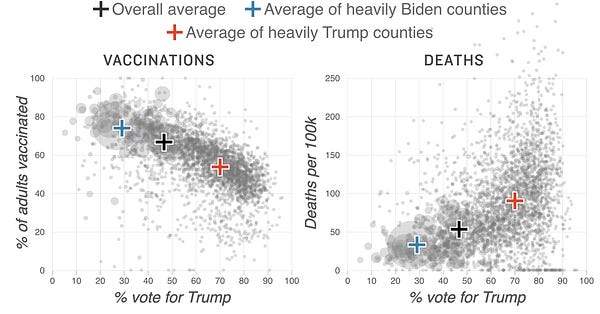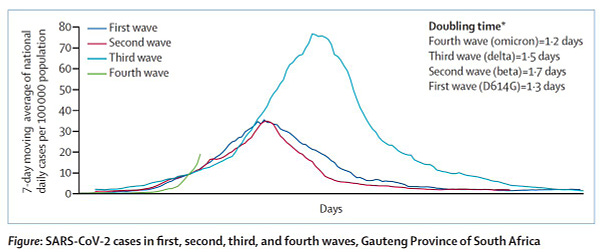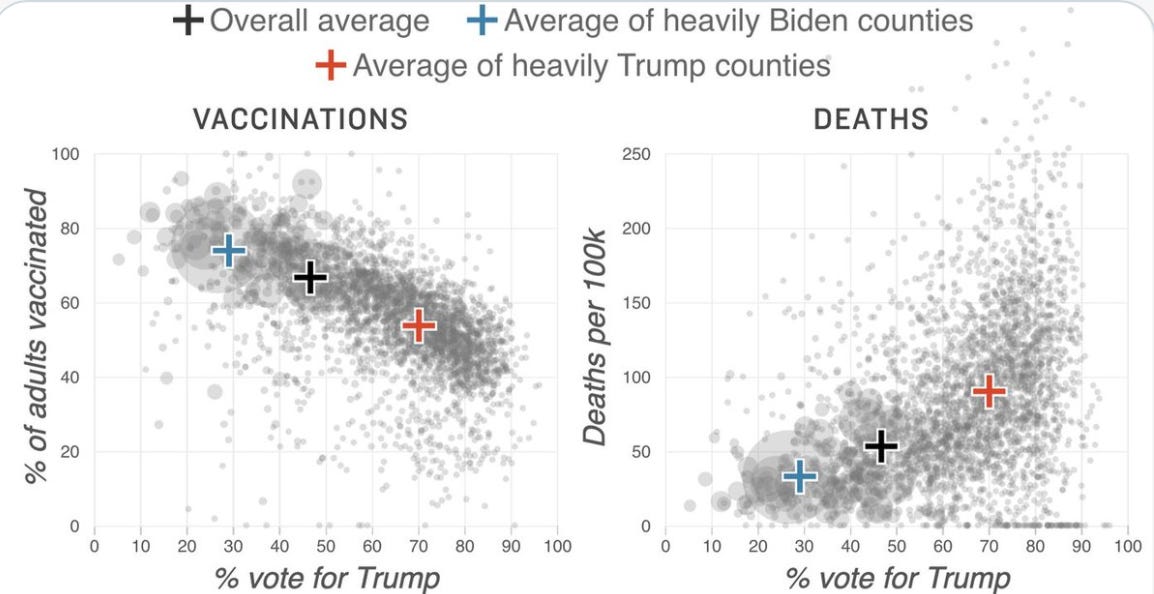One Really Should Not Say: "Þere Is a Choice Between Vaccines & Masks"; & BRIEFLY NOTED: For 2021-12-05 Su
Things that went whizzing by that I want to remember...
First:
Third doses—hell, first doses—are in short supply worldwide. Masks and avoiding crowding together in effective batcaves are not in short supply worldwide. So let me second Claudia on this: there is no either/or tradeoff here.
To say that we should focus on vaccines “instead of” masks and social distancing and other extremely cheap and easy non-pharmaceutical measures to deal with the fact that there are three days during which you are infectious before you know you are—well, the “either/or” in place of “both/and” is something I find hard to interpret except as a form of two-sided affinity fraud. Suppose you, on the one hand, don’t want to come across as an anti-science COVID denialist who has unmoored himself from reality. Suppose you, on the other hand, don’t want to come across as an enemy of human liberty and a servant of the TOTAL STATE. Pro-vaccine and anti-mask is a position you might come up with.
At least it is better than anti-vaccine and pro-horse dewormer:
Claudia Sahm: ‘Tyler Cowen: “I say it is third doses we should be doubling down on, not masks… emerging science on third doses is much stronger, and most countries have been dropping the ball on that one.“ I don’t understand the either/or on mask vs vaccines debates. I absolutely, positively think we should vaccinate the world. and I would drop all the intellectual property protections on the vaccine to get mass production in developing countries…. One thing I think about is the social signaling value of masks. Covid is a collective problem that the United States and other vaccine-access-rich countries have turned into an individual choice battle (again, thanks a lot to libertarians for banning the word ”society“). Impossible to know who is vaxxed, so I take comfort when I walk into the grocery store and people are masked. I live in a high vax area and masks are not mandatory. to me masks say ”I care about you too." makes me feel better. ANYTHING that makes us feel better is a godsend…. PS… Tyler has come a long way from asking what epidemiologists’ GRE scores were. see, he has emotions too, and Easter Sunday 2020 (really that was the day he chose to blast them) was an emotional time for all of us…
LINK:


One Picture:
One Video:
Vaccine Makers Project: How COVID-19 mRNA Vaccines Work <https://vimeo.com/579667076>:
Very Briefly Noted:
Wikipedia: Panic of 1837 <https://en.wikipedia.org/wiki/Panic_of_1837>
Peter Hotez: ’Vaccine researcher Peter Hotez is deeply troubled, a winter surge/omicron brewing “I’m not trying to change Republican or far-right thinking,” he says “I’m trying to say ‘The anti-science doesn’t belong; it doesn’t fit. Just stop it and save lives’”…


Eric Topol: ’Omicron’s doubling time in Gauteng exceeds the prior variants of concern, but the question as to whether in can displace Delta as the dominant variant there and globally looms… <https://t.co/cMPX6RvuRR>


Matthew Yglesias: Omicron Is a Reminder of How Little We’re Doing on Pandemic Prevention: ‘Our science is impressive — our investments in logistics and manufacturing capacity much less so…
John Ganz: The Political Economy of Reaction: ‘Being involved in some public outrage is a very quick and effective form of publicity…. Often these stances involve a sort of cant or “whiny heroism” to borrow a wonderful phrase from Fritz Stern’s The Politics of Cultural Despair…. This connection between journalism, theatricality, and cultural politics feels very familiar to me from reading about the 19th and 20th century…
Paragraphs:
Wolfgang Keller & Carol Shiue: Modernisation & China’s ‘Century of Humiliation’: ‘China end[ed] centuries of relative isolation… [when forced to open] open dozens of ‘treaty ports’ to Western traders…. [This] shifted the focus of capital markets from inland areas to the coast… increased the number of banks, firm investment, as well as the adoption of steam engines and industrial machinery, and significantly lowered local interest rates…. Western intervention in the 19th century had a substantial role in creating China’s economy today. Offering the year 1842 as the turning point that explains the Chinese economy we see today pre-dates 1921 (foundation of the Communist Party of China), 1949 (foundation of People’s Republic of China), and 1978 (beginning of market reforms). The development of China was not simply propelled by its own pre–1800 history, or by post–1978 reforms. The nearly 100 years of semi-colonisation have shaped China’s economy today as one focused on the coastal areas…
LINK: <https://voxeu.org/article/modernisation-and-china-s-century-humiliation>
Will McLean (2008): A Commonplace Book: Buying Power of 14th Century Money: ‘What was 14th century money worth in today’s dollars? That’s tricky, because it depends on what you were buying. In the second half of the 14th century, a pound sterling would: Support the lifestyle of a single peasant laborer for half a year, or that of a knight for a week. Or buy: Three changes of clothing for a teenage page (underclothes not included) or Twelve pounds of sugar or A carthorse or Two cows or An inexpensive bible or ten ordinary books or Rent a craftsman’s townhouse for a year or Hire a servant for six months. It should be obvious from the above list that the conversion rate depends a great deal on what you buy. A husbandman or yeoman servant spent most of his budget on food and clothing, which have become relatively cheap since the industrial revolution. For that basket of goods, a pound sterling might buy $500 worth of goods today. On the other hand, a knight or noble might spend a quarter of his income on servants, and much of the rest on handmade luxury goods, things that were relatively cheap then and expensive today. For that bundle of goods, a pound might buy $1,800 worth of goods today…
LINK: <http://willscommonplacebook.blogspot.com/2008/07/buying-power-of-14th-century-money.html>
Philippe Lemoine: Population Structure & Transmission: ‘If the population can be divided into networks of quasi-homogeneous mixing populations that are internally well-connected but only loosely connected to each other, the effective reproduction number can undergo large fluctuations even in the absence of behavioral changes…. [This] could explain several phenomena beyond the cyclical nature of the pandemic and the disconnect between transmission and behavior—why the transmission advantage of variants is so variable, why waves are correlated across regions, why even places with a high prevalence of immunity can experience large waves—that are difficult to explain within the traditional modeling framework…. In the presence of complex population structure, the methods that have been used to estimate the impact of non-pharmaceutical interventions are totally unreliable…. We should try to find data about the characteristics of the networks on which the virus is spreading and make sure that we have such data when the next pandemic hits so that modeling can properly take population structure into account…
Robert Pleasants (1785): To George Washington: ‘It seems highly probable to me, that thy example & influence at this time, towards a general emancipation, would be as productive of real happiness to mankind, as thy Sword may have been: I can but wish therefore, that thou may not loose the opertunity of Crowning the great Actions of thy Life, with the sattisfaction of, “doing to Others as thou would (in the like Situation) be done by,” and finally transmit to future ages a Character, equally famous for thy Christian Virtues, as thy worldly achievements: For notwithstanding thou art now receiving the tribute of praise from a grateful people, the time is coming when all actions will be weighed in an equal ballance, and undergo an impartial examination; how inconsistant then will it appear to posterity, should it be recorded, that the Great General Washington, without fee or reward, had commanded the united forces of America, and at the expence of much Blood & treasure been instrumental in relieving those States from Tyranny & oppression: Yet after all had so far countinanced those Evils, as to keep a number of People in absolute Slavery, who were by nature equally entitled to freedom as himself. O Remember I beseech thee that “God will not be mocked,” and is still requiring from each of us, to, “do justly, love mercy and walk humbly before him.”…
LINK: <https://founders.archives.gov/documents/Washington/04-03-02-0384>
Chad Orzel: How Notable Is Science?: ‘The New York Times “Notable Books” list…. The non-fiction… fifty books… about science… three: Life’s Edge by… Carl Zimmer, Kindred by Rebecca Wragg Sykes, and The Extended Mind by Annie Murphy Paul. That’s actually pretty good, by NYT Notable Books standards…. [But] 14 of the 50 non-fiction titles are tagged by the Times as Memoirs— are unhappy childhoods really 4.7 times more notable than the entirety of science?…
LINK:








Wearing masks accepts that it is mete, just, and our bounden duty to comply with the exercise of the civil power for the greater good.
Mammonites reject any concept of "greater good"; there is good for them, and bad for them, and nothing else. They're not strong on accepting that the civil power might properly be applied to constraining their conduct at all, ever.
This makes it look like a technocratic solution -- vaccines -- might be a compromise position; it avoids having to confront mammonites.
The vaccines are not anything like powerful enough for that to work; against wild type, aggressive mandatory vaccination might have worked. (but only might). Against Delta, it won't, and against Omicron perhaps a greater won't. Aggressive mandatory vaccination _and_ aggressive mandatory public health measures _and_ long-term movement controls _and_ truly aggressive efforts to extirpate the disease in animal reservoirs will all be required.
I could wish for a greater political will to this end; I could wish for a general acknowledgement that extirpation is the only practical course. And while I'm wishing, I could wish that someone in the halls of power would notice that if there are humans in 2100, mammonism will be extinct. We're not getting through this by agreeing that whatever you've done, you get to keep the loot.
re: How Notable Is Science?
The problem is not that the NYT "notable" books list is short of science books, but rather that the NYT is even considered an arbiter of "notable" books. It reminds me of Allan Bloom's 1980s railing about the decline of liberal education as if there was a loss when education was no longer focussed on a set of ideas he was exposed to. (Note the NYT gave his book (The Closing of the American Mind) a +ve early review, whereas later reviews by others were far more -ve.) I suspect that the problem is that some want a high place in the pantheon of culture which would require limiting that cultural extent to be encompassed by a single mind. If CP Snow was correct about the Two Cultures (and watching archived BBC shows supports that view), then there are realms of culture that are no longer mainstream. Just as internet commerce by Amazon enabled long-tailed products, so social media allowed the viable fragmentation of interests. Those of us who love science have no problem finding good books on almost any domain of science and can happily ignore the entreaties of those who would peddle other interests.
If we really believe that diversity is a good thing for civilizational adaptability, then this fragmentation is desirable, even if those wishing to maintain a homogenous culture would wish otherwise.